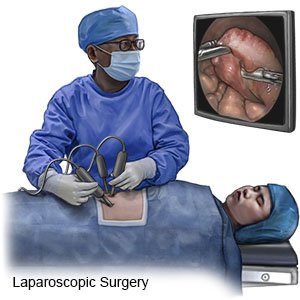Laparoscopic Adrenalectomy
Medically reviewed by Drugs.com. Last updated on Jul 7, 2024.
Laparoscopic adrenalectomy is surgery to remove all or part of your adrenal gland. It is usually done when a small tumor is found on the gland. Small incisions are made in your abdomen. A laparoscope is inserted through the incisions. A laparoscope is a long metal tube with a tiny video camera and a light on the end. The camera displays pictures of your adrenal glands on a monitor. The monitor is used to guide the surgery tools to the right place.
WHILE YOU ARE HERE:
Before your surgery:
- Informed consent is a legal document that explains the tests, treatments, or procedures that you may need. Informed consent means you understand what will be done and can make decisions about what you want. You give your permission when you sign the consent form. You can have someone sign this form for you if you are not able to sign it. You have the right to understand your medical care in words you know. Before you sign the consent form, understand the risks and benefits of what will be done. Make sure all your questions are answered.
- An IV is a small tube placed in your vein that is used to give you medicine or liquids.
- General anesthesia will keep you asleep and free from pain during surgery. Anesthesia may be given through your IV. You may instead breathe it in through a mask or a tube placed down your throat. The tube may cause you to have a sore throat when you wake up.
- A nasogastric (NG) tube may be used to give you liquids, nutrition, or medicine. The tube may instead be attached to suction if healthcare providers need to keep your stomach empty. The NG tube is put into your nose and guided down your throat until it reaches your stomach.
During your surgery:
- Small incisions will be made in your abdomen. Healthcare providers will insert the laparoscope and other tools into the incisions. Your abdomen will be filled with carbon dioxide gas to make it swell. The adrenal gland will be separated from its attachments and removed.

- The incisions will be closed by stitches or tape, and covered with bandages.
After your surgery:
You will be taken to a recovery room until you are fully awake. Healthcare providers will watch you closely for any problems. When healthcare providers see that you are okay, you will be taken back to your hospital room. The bandages used to cover your stitches keep the area clean and dry to prevent infection. A healthcare provider may remove the bandages soon after your surgery to check your incisions.
- You will be helped to walk around after surgery. Movement will help prevent blood clots. You may also be given exercises to do in bed. Do not get out of bed on your own until your healthcare provider says you can. Talk to healthcare providers before you get up the first time. They may need to help you stand up safely. When you are able to get up on your own, sit or lie down right away if you feel weak or dizzy. Then press the call light button to let healthcare providers know you need help.
- Medicines may be given for pain or nausea, or to prevent a bacterial infection.
RISKS:
Problems may happen during your surgery and may lead to open surgery. An example is bleeding that cannot be controlled. Your stomach, intestines, blood vessels, or kidneys may get injured during the surgery. You could also have trouble breathing, get an infection, or have too much bleeding after surgery. You may develop a life-threatening blood clot. The gas used to expand your abdomen may cause shoulder or chest pain for 1 to 2 days after your surgery.
CARE AGREEMENT:
You have the right to help plan your care. Learn about your health condition and how it may be treated. Discuss treatment options with your healthcare providers to decide what care you want to receive. You always have the right to refuse treatment.© Copyright Merative 2024 Information is for End User's use only and may not be sold, redistributed or otherwise used for commercial purposes.
The above information is an educational aid only. It is not intended as medical advice for individual conditions or treatments. Talk to your doctor, nurse or pharmacist before following any medical regimen to see if it is safe and effective for you.
Further information
Always consult your healthcare provider to ensure the information displayed on this page applies to your personal circumstances.
